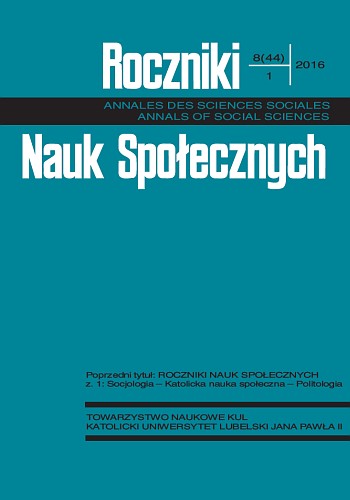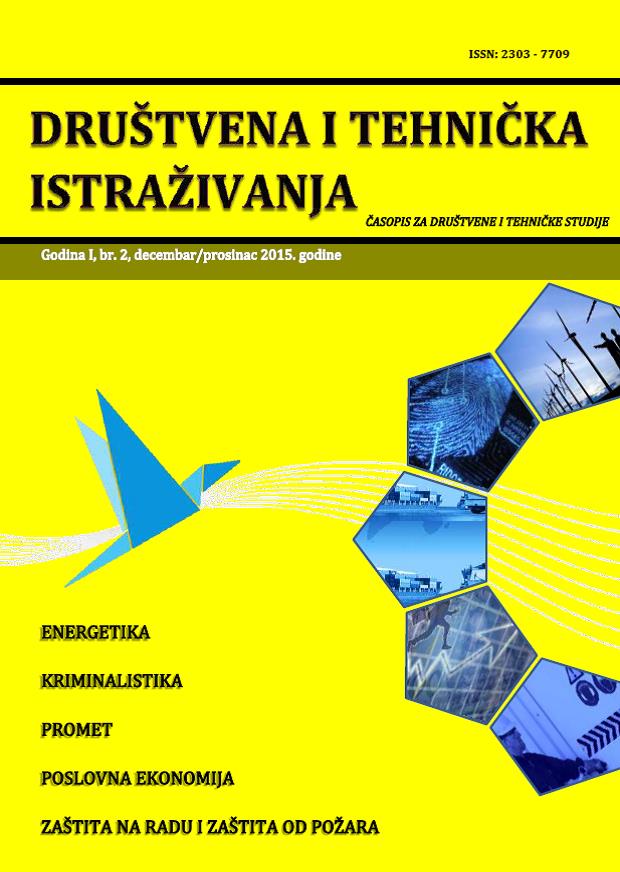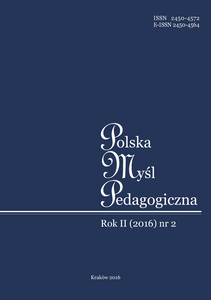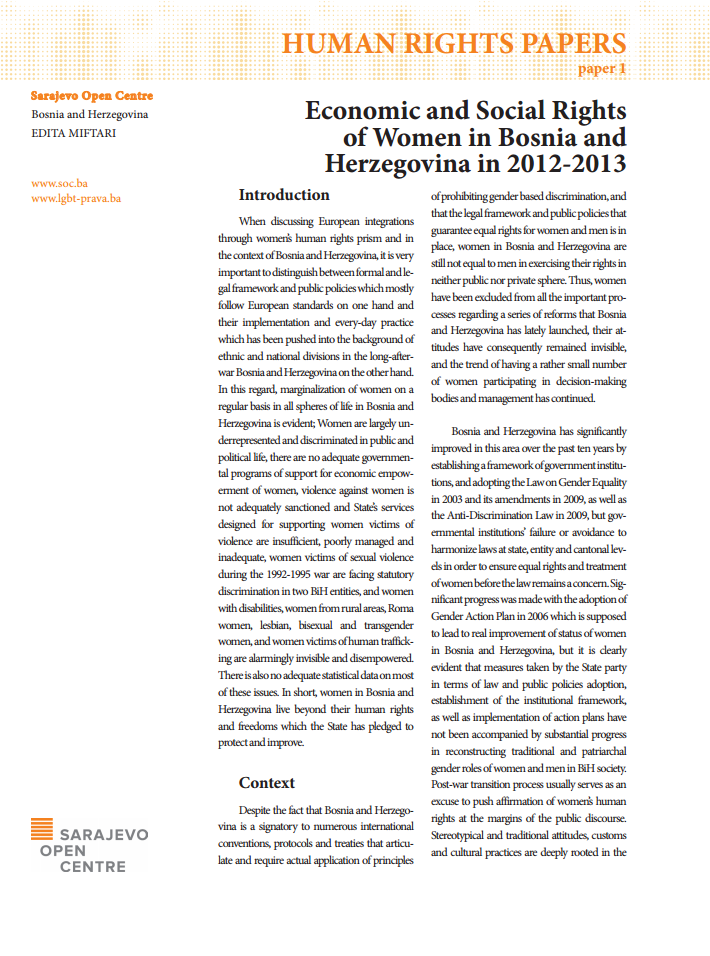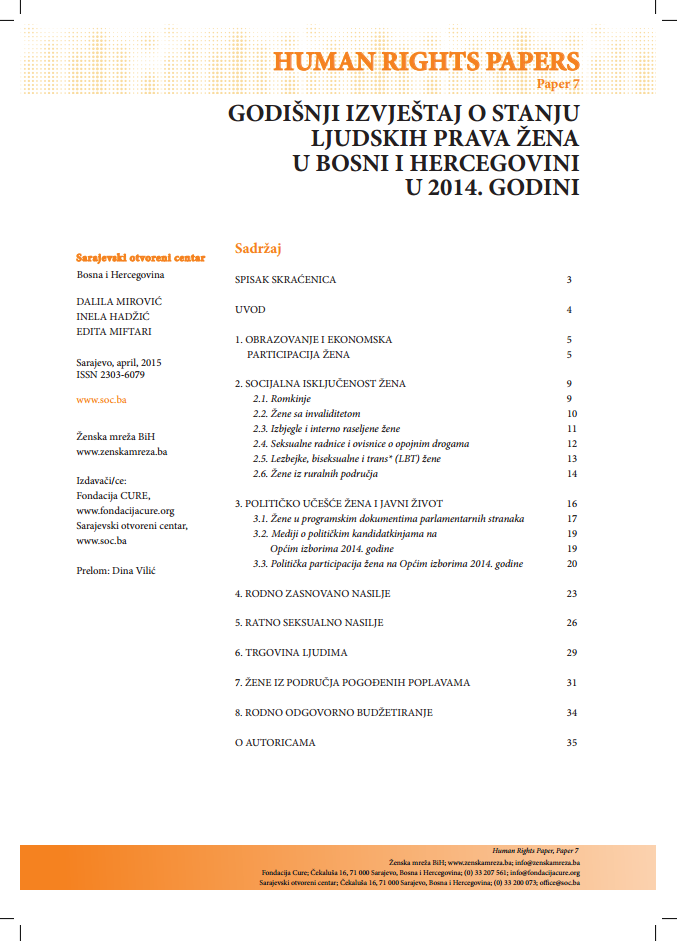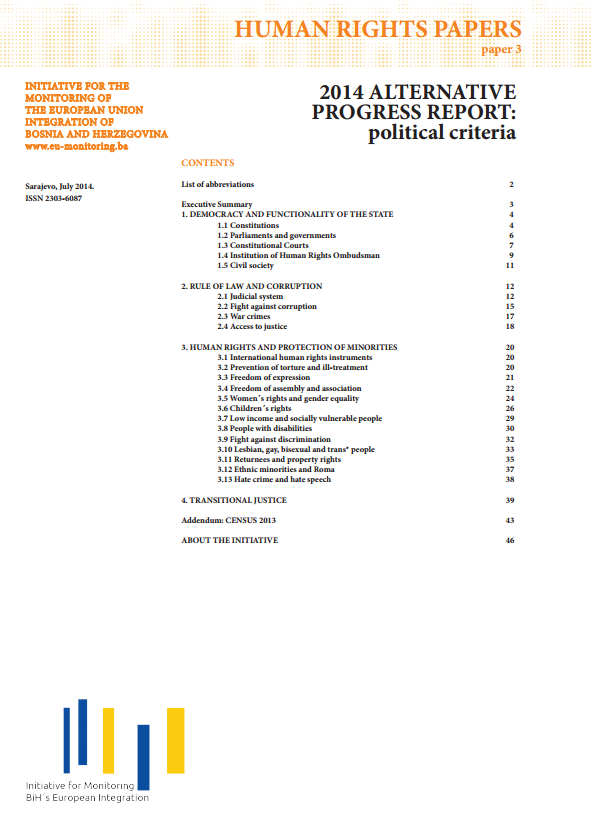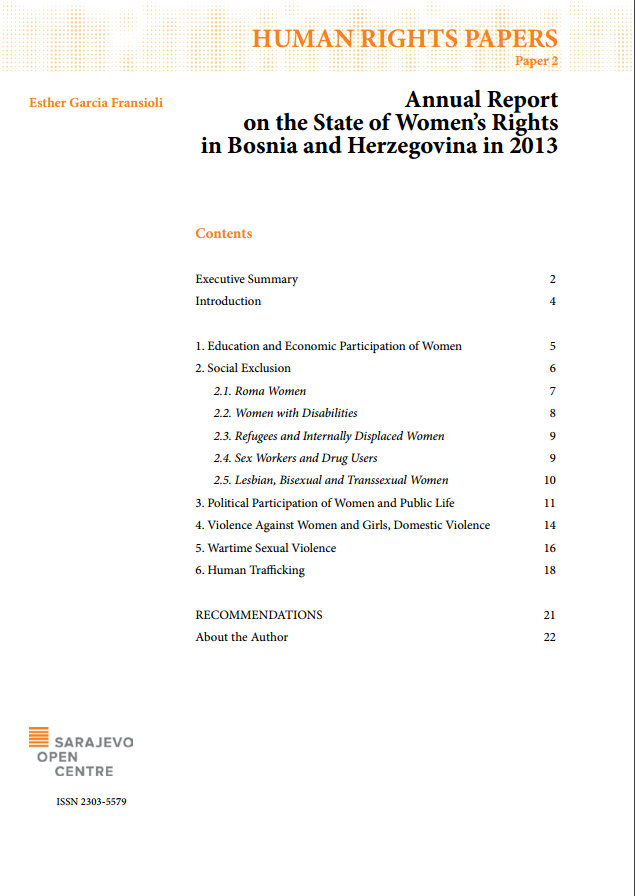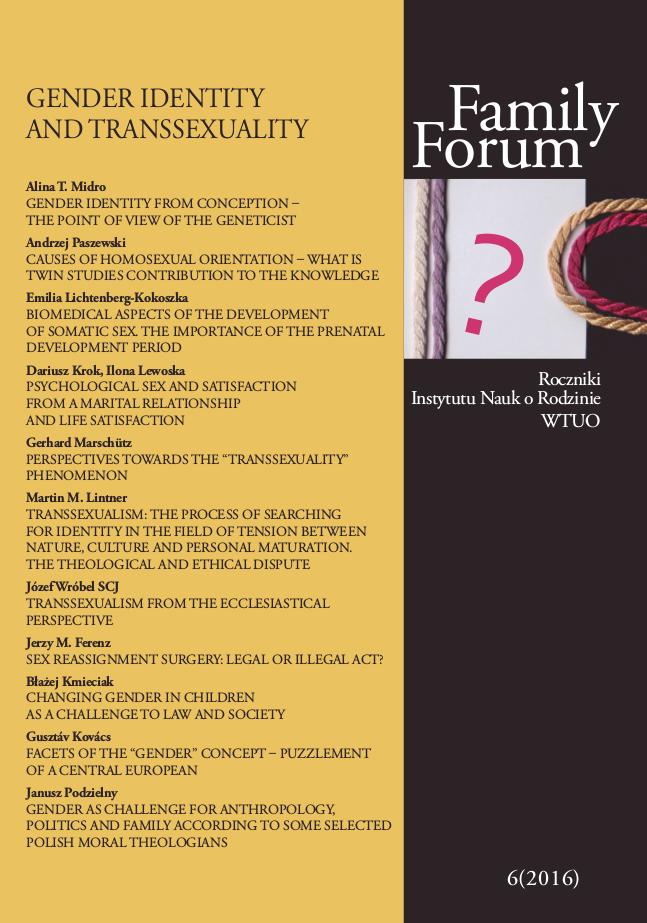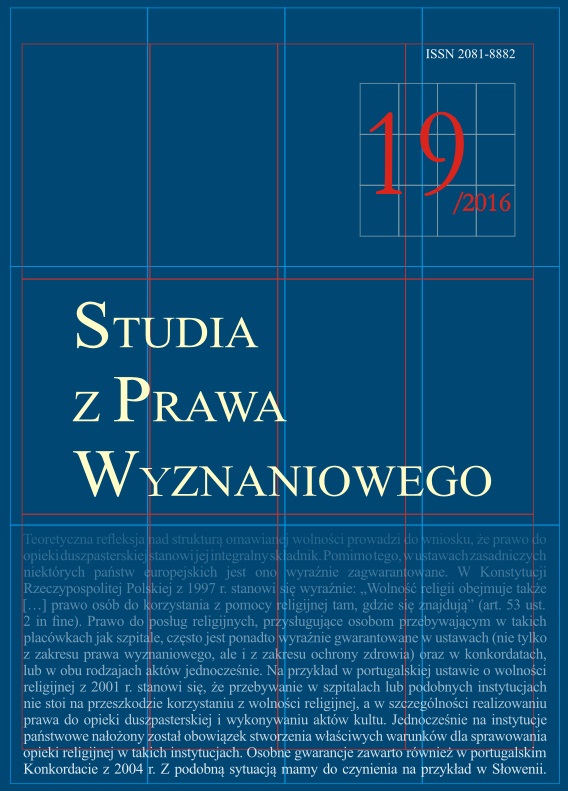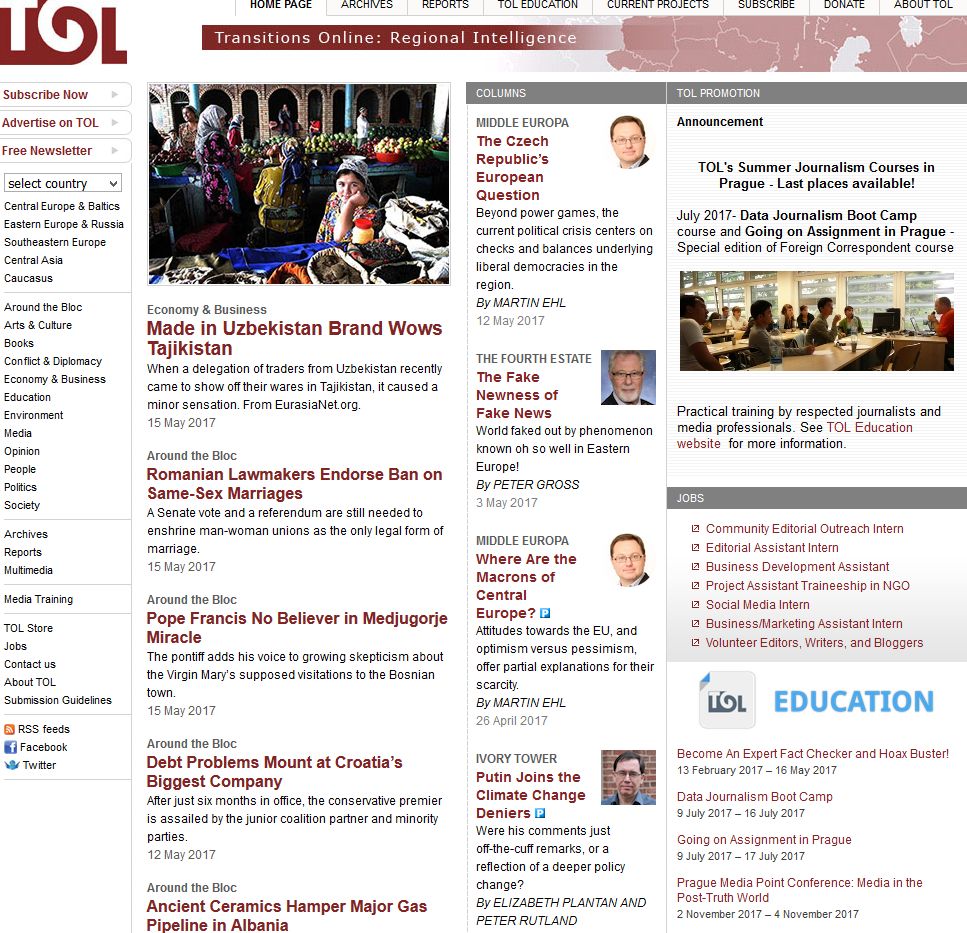Author(s): Esther Garcia Fransioli / Language(s): English
Issue: 2/2013
Women in Bosnia and Herzegovina are still facing multiple layers of discrimination and are not equal to men in their abilities to access and exercise their rights. Over the past years, formal legislative and public policy frameworks related to the protection of women’s rights in Bosnia and Herzegovina have significantly improved. There is a Law on Gender Equality (2003, 2009 with consolidated version from 2010) and a new Gender Action Plan (2013-2017) at the BiH level (adopted in September 2013); a 40% gender quota has been included in the BiH Election Law (April 2013), and there is new entity-level legislation and public policies for preventing and combating domestic violence. In addition, Bosnia and Herzegovina has signed and ratified all major international documents in the sphere of women’s human rights, including the Council of Europe Convention on Preventing and Combating Violence against Women and Domestic Violence (Istanbul Convention) in 2013. However, real change in practice is very slow; women remain deprived of the possibility of enjoying human rights in both the private and the public sphere, and the dialogue and partnership between the government and nongovernmental organizations to advance and protect women’s human rights is still far from satisfactory. there is a serious problem of gender-based inequalities and discrimination in women’s access to the labour market, combined with structural stereotyping and the problem of unpaid work, which aspects women disproportionately. The current employment strategies do not seriously address the issue of female participation in the labour market, the improvement of which would contribute to reducing poverty. All these combined factors are rejected in the low number of employed women in 2013: only around one third (37.3%) of all the employed people in BiH are women, which means that there was not a significant improvement in 2013 in comparison with previous years. It is also alarming that there are twice as many women than men with university degrees who are unemployed. In 2013, the situation of parental rights also remained stagnant, since maternity leave is regulated differently in different parts of BIH and there are places where women don’t even have access to maternity leave pay or are left jobless after becoming pregnant. In the public and political sphere, women are still underrepresented; the situation is even worse for women that belong to any of the various groups that face double discrimination and are at higher risk of social exclusion. For these groups of women, there is still the significant problem that the available quantitative and qualitative gender data is disaggregated (e.g. there is no data available regarding women with disabilities). It is also alarming that in 2013, the needs of women were not specifically expressed in many of the existing action plans that were revised and that still have not been granted su¬ cient funds for their implementation (e.g. Revised Action Plan of BiH on the Educational Needs of Roma from 2010). In 2013, a 40% gender quota was introduced into the Election Law of Bosnia and Herzegovina, an increase from 33%. Real progress will be seen if this law is properly implemented in the 2014 elections because currently, women are underrepresented in all political fields. The following initiatives took place in 2013: the women’s caucus of the House of Representatives of the FBiH was established (March 2013), several NGOs created the Women’s Platform for Constitutional Reform from a Gender Perspective and the first Memorandum of Understanding to monitor the implementation of Action Plan of the UNSCR 1325 was signed (October 2013). The results of these initiatives will be observed in the next few years. Violence against women and girls continues to be a serious issue in BiH. New data available starting in 2013 in the field of domestic violence will hopefully provide a good basis for future prevention and intervention measures with survivors. Findings indicate that almost half of the women in BiH older than 15 have been subjected at least once in their lifetime to some kind of violence and that women are exposed to a high risk of violence, first in her immediate, intimate environment of relationships with her partner and family, and then in the broader community. Another long-lasting and serious issue for BiH is the wartime sexual violence suffered by tens of thousands of women twenty years ago. These women are still in need and seek justice and reparation. The visit in 2013 of the United Nations Secretary General’s Special Representative for Sexual Violence in Conflict confirmed that BiH has made scandalously little progress in dealing with these cases and there is a need to develop a comprehensive approach to improve the status and position of all female victims of the war, including by combating stigma attached to sexual violence, and expand the provisions of compensation, support and rehabilitation measures and benefits, and ensure equal access to such services for all female victims irrespective of their place of residence. Regarding human trafficking, effective victim identification procedures – especially concerning women and girls from Roma communities and internally displaced women, who are increasingly affected – is a pending issue. Cooperation between state institutions and nongovernmental organizations engaged in prevention of human trafficking has not improved in the last years. This human rights paper seeks to put a spotlight on the status of women rights in Bosnia and Herzegovina in 2013 – to point out the progress that has been made so far, as well as to highlight the marginalization and systematic discrimination that women continuously experience. This paper contains information based on a desk review of the most relevant and recent documents issued by governmental institutions, nongovernmental and international organizations recent data from local and national research on women’s issues and observations from the field.
More...
